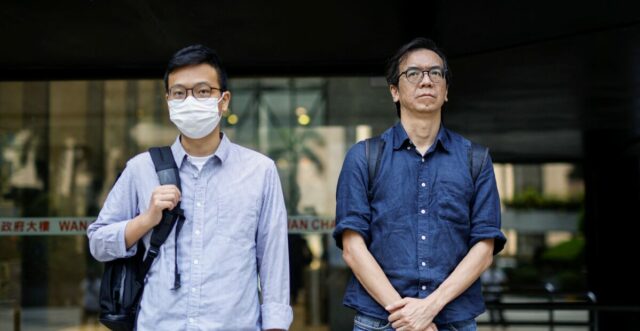After Hong Kong police raided Stand News and arrested two editors, its staff decided
that to avoid more arrests they had to shut down the online media outlet, whose hard-hitting reports of the 2019 pro-democracy protests saw its readership surge.
Later that day, Dec. 29, 2021, a group of staffers gathered around a single computer to wipe their archives in a newsroom stripped mostly bare of terminals and equipment by police.
“It’s very depressing that all our hard work was gone in one night,” said Louise, a former video journalist at Stand News.
On Thursday, a Hong Kong court found former Stand News chief editor Chung Pui-kuen, 54, guilty of conspiring to publish seditious publications. Another editor, Patrick Lam, 36, was also convicted.
The case is the first sedition conviction of journalists since Hong Kong’s transfer of sovereignty from Britain to China in 1997, and critics, which include the U.S. government, say it reflects deteriorating media freedoms under a years-long security crackdown.
Stand News started off as a struggling non-profit in 2014, with a skeleton staff heavily reliant on public donations.
During Hong Kong’s months-long pro-democracy protests in 2019 the outlet’s popularity skyrocketed given its hours-long Facebook live streams, in-depth features and investigative reports, with more than 20 million page views per month.
The liberal tone of Stand News reportage helped it attract fresh readers, as people sought more freedom and democracy amid China’s tightening control over the city. A flood of fresh donations saw the newsroom nearly triple to over 60 staff.
Six former staffers said Chung, the founding editor, was committed to hard-hitting reports, using text, graphics and visuals, to hold authorities to account. This was at a time when risks were growing with the closure of the pro-democracy Apple Daily newspaper and a spate of arrests, they said.
“He was really willing to invest in stories that he thought were worth doing,” said Athanasia, a former reporter who declined to give her full name given the sensitivity of the topic.
After the verdict, Chung said he had no regrets. “I believe that these stories and ideas can stimulate and inspire people’s thinking, reflect the times, and shape history,” he said in a mitigation letter.
With Reuters inputs
Thirty eight years in journalism, widely travelled, history buff with a preference for Old Monk Rum. Current interest/focus spans China, Technology and Trade. Recent reads: Steven Colls Directorate S and Alexander Frater's Chasing the Monsoon. Netflix/Prime video junkie. Loves animal videos on Facebook. Reluctant tweeter.





